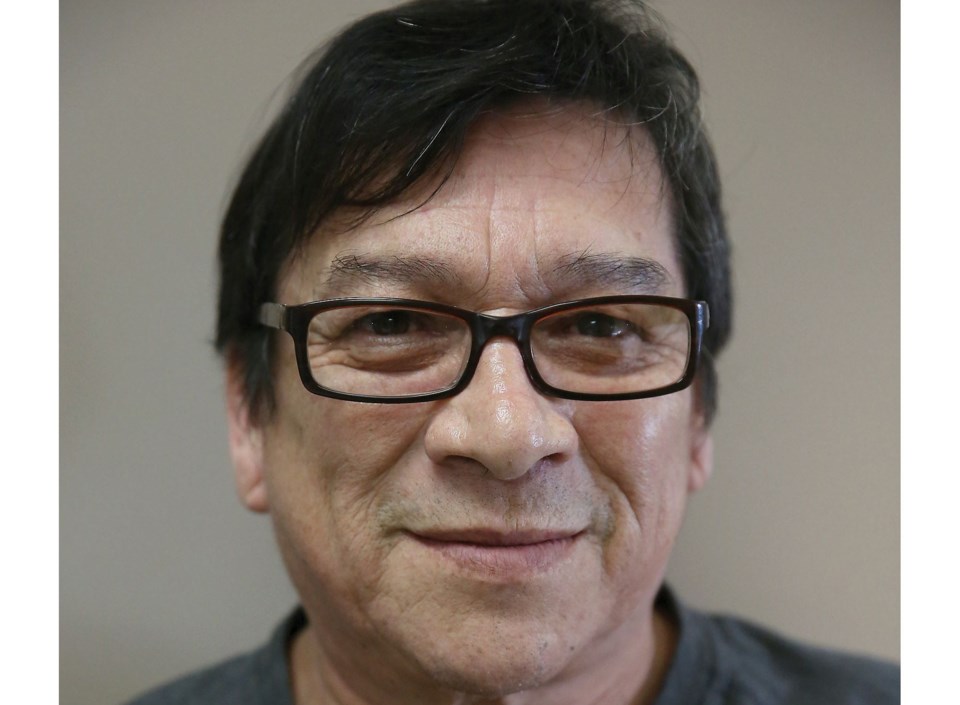Editor's note: This story won the gold medal for Best Multimedia Feature in the 2016 Canadian Community Newspaper Association Awards, announced April 15, 2016.
Embedded within the photo below is video, a photo gallery, and a few extras to check out. Click on the icons to get to know Allan Mousseau a bit better.
When he got the news, his first instinct was to step out in front of the bus barreling down Granville Street in the middle of Vancouver.
"But I didn't do it - I was too chickenshit," said Allan Mousseau, 58, with a shrug and a sheepish grin.
That was back in 1984 when he was diagnosed with HIV.
He was doing plenty in Vancouver, not all of it good.
"Drugs and alcohol," said Mousseau. "Oh yeah, and going to school - I got my upgrading."
Despite being an alcoholic, Mousseau went to get a physical every six months because he wanted to know what was happening to his body as a result, he said.
"I wanted to be a healthy alcoholic - I know, it don't make sense," laughed Mousseau. "I went in for my six-month physical and then the doctor told me to come back. When I went back he told me 'I have good news and bad news' so I told him to tell me the good news first. He said 'there is no good news. You are HIV positive'. When he told me I felt like my world was shattered. It was like going down a dark hall with no vision - that was it. And I thought about suicide right away."
That's when Mousseau considered stepping in front of the bus.
"Because back in the early 80s when you heard that news, it was a death sentence," said Mousseau. "I tried to commit suicide a few times but nothing worked so I gave up and moved on. And I think what I'm going to say right now is going to be really weird but I think being diagnosed saved my life."
Mousseau thought about his life and considered the doctor's dire prediction that he only had five years to live.
"He was so cold when he said that."
Mousseau decided to get educated about the disease.
"I was in partnership with it," said Mousseau. "Because I wanted to live."
After he hit the five-year survival mark he decided to be proactive by learning to look after himself. He practiced meditation and did research on side effects of medications he was taking.
"At first it was a scary, bumpy road filled with aches and pains and heartaches and memories, along with physical ailments that come with HIV like night sweats, weight loss, uncontrollable diarrhea, and you can't sleep because you're thinking about it all the time."
Mousseau had to deal with peripheral neuropathy, which results in damage to peripheral nerves, often causing weakness, numbness and pain, usually in hands and feet. It can also affect other areas of the body. He also got shingles, experienced hair loss and had to pay particular attention to mouth care.
"So I made sure everything was balanced - balanced meals, balanced diet, a bit of exercise and that's how I started," said Mousseau. "And that's when I started feeling better."
He still used crack cocaine occasionally but he said he didn't make a habit of it.
"When the crack made me really sick and made me think of suicide it really scared the heck out of me and I quit," said Mousseau. "That was Christmas eve approximately six years ago."
Mousseau has been on the right medication for HIV since 1989 and was in a case study between 1984 and 1989 to see what worked and what didn't. A couple of the medications worked and one made him so sick he was worse off with it than without it.
He moved to the Okanagan in 1989 and a doctor there said he was over prescribed and altered his medication therapy.
As the years passed, Mousseau said the medications for HIV have come a long way.
Along with his prescribed Western medicine, Mousseau enhances his treatment with traditional First Nations medicine with advice from his brother, who is a healer in Toronto.
Mousseau moved to Prince George three years ago and found Positive Living North (PLN): No khyoh t'sih'en t'sehena Society, which provides support, awareness education and prevention services to people living with, affected by and at-risk for HIV/AIDS/HCV - Hepatitis C virus.
Mousseau works as a nutritional support worker at the street-level outreach the Fire Pit Cultural Drop In Centre, a gathering place where people can share a meal, socialize, speak to elders, and take part in cultural activities that lead to healing and the reduction of at-risk behaviours. The Fire Pit program is a direct response to the HIV/AIDS/HCV epidemic Northern B.C. communities are currently experiencing.
Positive Living North also has a positive prevention education program called Frontline Warriors.
As a Frontline Warrior, Mousseau shares his story with the community.
"I talk to whoever wants to listen," said Mousseau. "High school students, parents, children, community members, anyone who wants to know - I talk to them."
There are some important points Mousseau likes to emphasize.
"HIV is not a death sentence," he said. "Please be careful of what you do when you go out there because there are many things that can sway you away from your thinking of good health such as drugs and alcohol. Don't be afraid of HIV - anyone close to you could be positive and you would never know it. Care about the people around you who are positive or not positive. Just care about each other. HIV is preventable and knowledge is your best medicine."
This week is HIV/AIDS Awareness Week in Canada, with World AIDS Day on Tuesday, which also launches Aboriginal AIDS Awareness Week. For more information about Positive Living North contact 250-562-1172 or drop by 1563 Second Avenue.




